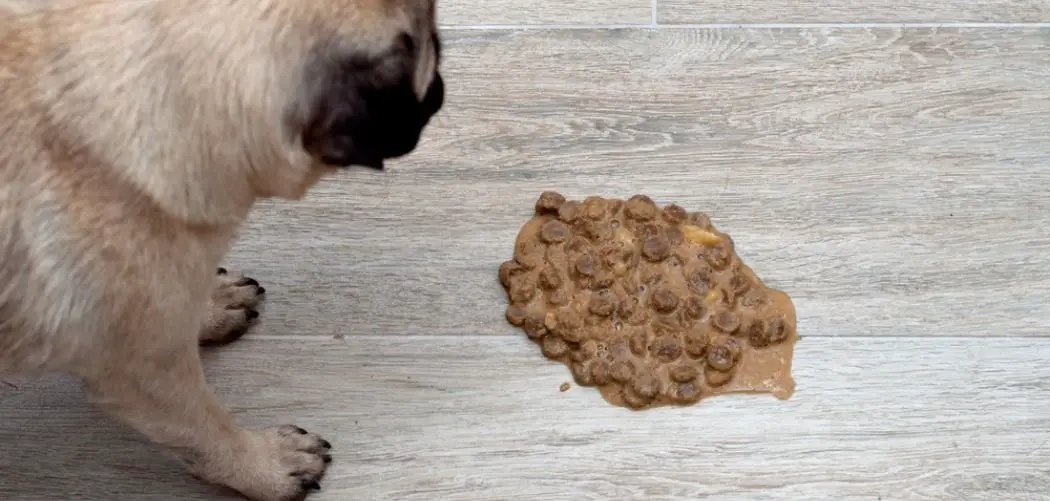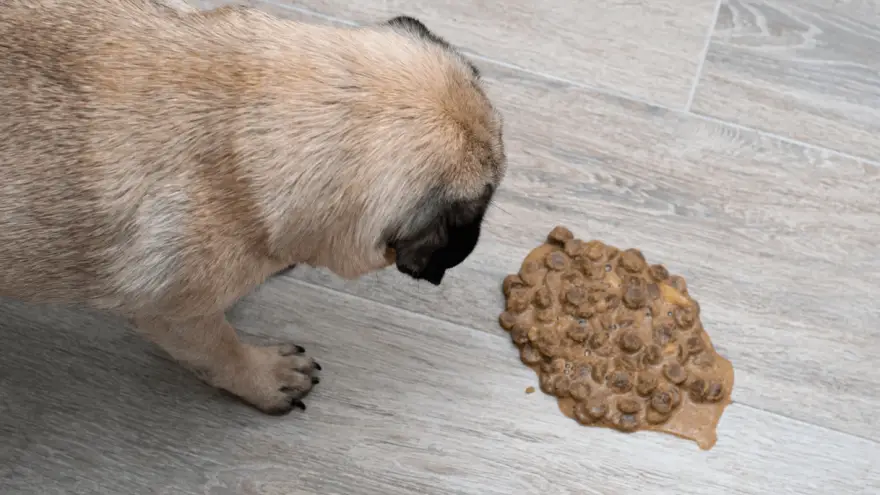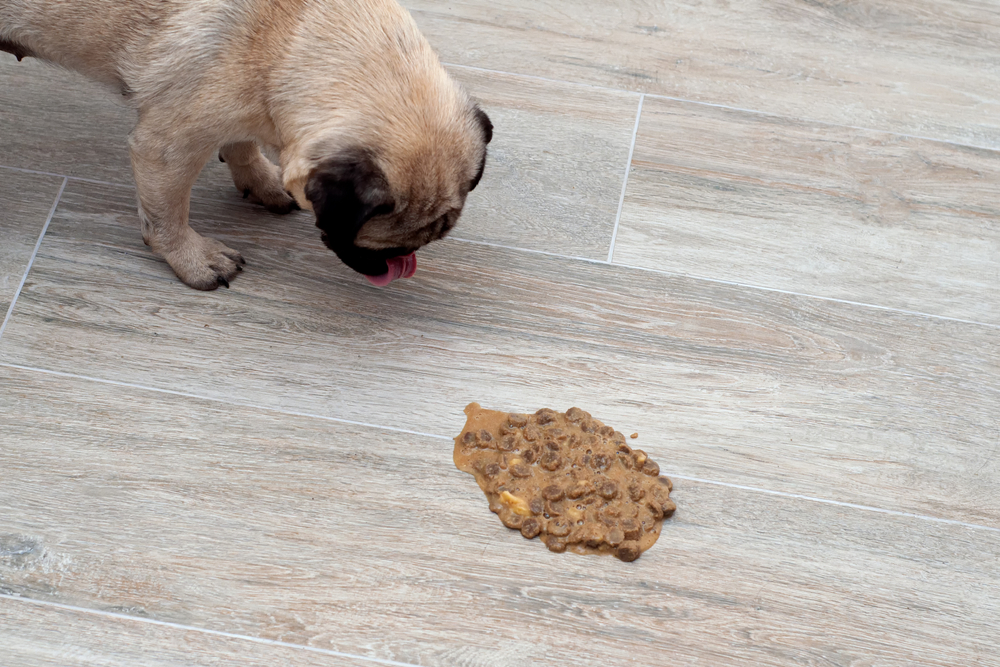Puppy vomiting undigested food can be a concerning issue for pet owners. This comprehensive guide will delve into the causes, symptoms, diagnosis, treatment options, and preventive measures associated with this condition, empowering you with the knowledge to care for your furry friend.
Understanding the underlying factors and appropriate interventions can help you navigate this situation effectively, ensuring the well-being and comfort of your beloved puppy.
Causes of Undigested Food Vomiting in Puppies

Undigested food vomiting in puppies can be a distressing experience for both the puppy and its owner. Understanding the underlying causes is crucial to provide appropriate treatment and prevent recurrence.
Underlying Medical Conditions
Certain medical conditions can impair the digestive process, leading to undigested food vomiting in puppies. These include:
- Gastrointestinal parasites:Parasites like roundworms, hookworms, and whipworms can reside in the puppy’s digestive tract, competing for nutrients and causing inflammation, resulting in vomiting.
- Pancreatitis:Inflammation of the pancreas, which produces digestive enzymes, can disrupt the digestive process, leading to undigested food vomiting.
- Inflammatory bowel disease (IBD):A chronic condition that causes inflammation in the intestines, affecting digestion and absorption of nutrients.
- Gastric dilatation-volvulus (GDV):A life-threatening condition where the stomach twists and fills with gas, causing bloat and undigested food vomiting.
Dietary Factors
Dietary factors can also contribute to undigested food vomiting in puppies:
- Dietary indiscretion:Ingesting inappropriate food items, such as garbage or table scraps, can overwhelm the puppy’s digestive system and cause vomiting.
- Sudden diet changes:Abruptly transitioning to a new diet can disrupt the digestive system, leading to undigested food vomiting.
- Food allergies:Some puppies may have allergic reactions to certain ingredients in their food, resulting in digestive upset and vomiting.
- Overfeeding:Consuming excessive amounts of food can overload the puppy’s stomach, causing it to vomit undigested food.
Environmental Triggers
Environmental factors can also induce undigested food vomiting in puppies:
- Stress:Stressful events, such as traveling, loud noises, or separation anxiety, can trigger vomiting in puppies.
- Motion sickness:Puppies traveling in cars or other vehicles may experience motion sickness, leading to undigested food vomiting.
- Eating too quickly:Puppies that eat their food too fast may not have enough time to chew it properly, resulting in undigested food vomiting.
- Ingestion of foreign objects:Puppies may ingest non-food items, such as toys or socks, which can cause obstruction and undigested food vomiting.
Symptoms Associated with Undigested Food Vomiting in Puppies

Puppies experiencing undigested food vomiting may exhibit a range of accompanying symptoms. These symptoms can provide valuable insights into the underlying cause of the vomiting and guide appropriate treatment.
The frequency and duration of vomiting episodes can vary depending on the severity of the condition. Some puppies may vomit only once or twice, while others may experience persistent vomiting over several hours or even days.
Appearance and Consistency of Vomited Food
The appearance and consistency of vomited food can also offer clues about the underlying cause of vomiting. In cases of undigested food vomiting, the vomited material typically consists of partially or fully undigested food particles.
- Partially digested food:The vomited food may appear partially chewed or broken down, indicating that it has been in the stomach for a short period of time.
- Fully undigested food:In some cases, the vomited food may be completely undigested, appearing as large chunks or pieces of food that have not been broken down at all.
Diagnostic Procedures for Undigested Food Vomiting in Puppies

When a puppy vomits undigested food, it is essential to determine the underlying cause to ensure proper treatment. A comprehensive diagnostic approach involves a combination of physical examinations, diagnostic tests, and a thorough assessment of the puppy’s history and environment.
Physical Examination
The physical examination provides the veterinarian with valuable information about the puppy’s overall health and condition. The veterinarian will assess the puppy’s vital signs, including temperature, heart rate, and respiratory rate, and perform a thorough physical examination to check for any abnormalities or signs of underlying medical conditions.
Diagnostic Tests
Diagnostic tests are often necessary to identify the specific cause of undigested food vomiting in puppies. These tests may include:
- Bloodwork:Blood tests can reveal abnormalities in organ function, electrolyte imbalances, or the presence of infections.
- Imaging:X-rays or ultrasound can help visualize the puppy’s digestive tract and identify any structural abnormalities, foreign bodies, or masses.
- Endoscopy:An endoscope, a thin, flexible tube with a camera attached, can be inserted into the puppy’s digestive tract to visualize the lining and look for any inflammation, ulcers, or other abnormalities.
Dietary History and Environmental Assessment, Puppy vomiting undigested food
In addition to physical examinations and diagnostic tests, a thorough dietary history and environmental assessment can provide important clues to the cause of undigested food vomiting. The veterinarian will ask about the puppy’s diet, including the type of food, frequency of feedings, and any recent changes in the diet.
The veterinarian will also inquire about the puppy’s environment, including any potential toxins or foreign objects that the puppy may have ingested.
Treatment Options for Undigested Food Vomiting in Puppies: Puppy Vomiting Undigested Food
Treatment for undigested food vomiting in puppies depends on the underlying cause and severity of the condition. Several approaches are available, including dietary modifications, medications, and, in rare cases, surgical intervention.
Dietary Modifications
Dietary modifications are often the first line of treatment for undigested food vomiting in puppies. These changes may include:
- Switching to a highly digestible diet, such as a puppy-specific formula or a diet specifically designed for sensitive stomachs.
- Reducing the amount of food given at each meal to prevent overeating.
- Feeding the puppy more frequent, smaller meals throughout the day to reduce the amount of food in the stomach at any one time.
- Avoiding table scraps or other fatty, rich foods that can upset the puppy’s stomach.
Medications
Medications may be prescribed to control vomiting and support digestion. These medications may include:
- Anti-emetics: These medications help to stop vomiting by blocking the signals in the brain that trigger the gag reflex.
- Prokinetics: These medications help to increase the motility of the stomach and intestines, which can help to move food through the digestive tract more quickly.
- Antacids: These medications help to neutralize stomach acid, which can reduce irritation and vomiting.
Surgical Interventions
In severe cases, surgical intervention may be necessary to address the underlying cause of undigested food vomiting. This may include surgery to correct a pyloric stenosis, a narrowing of the stomach outlet, or to remove a foreign body from the digestive tract.
Preventive Measures for Undigested Food Vomiting in Puppies
Undigested food vomiting in puppies can be distressing for both the puppy and its owners. Fortunately, there are several preventive measures that can be taken to reduce the risk of this issue.
Feeding Practices
* Feed puppies small, frequent meals throughout the day to prevent overeating and reduce the likelihood of regurgitation.
- Avoid feeding puppies table scraps or human food, as these can be difficult to digest and may lead to vomiting.
- Use a high-quality puppy food that is appropriate for the puppy’s age and breed.
- Ensure the puppy has access to fresh water at all times.
Balanced Diet and Portion Sizes
* Provide a balanced diet that meets the puppy’s nutritional needs. Avoid sudden changes in diet, as this can upset the puppy’s digestive system.Measure the puppy’s food portions carefully to prevent overfeeding. A general guideline is to feed 1/2 to 1 cup of food per 10 pounds of body weight per day, divided into two or three meals.
Environmental Enrichment and Stress Reduction
* Provide a safe and comfortable environment for the puppy.
- Engage the puppy in regular exercise and mental stimulation to reduce boredom and stress.
- Avoid situations that may cause the puppy to become anxious or stressed.
- Ensure the puppy gets plenty of rest and sleep.
By following these preventive measures, you can help reduce the risk of undigested food vomiting in your puppy and promote its overall health and well-being.
Clarifying Questions
Why is my puppy vomiting undigested food?
Undigested food vomiting in puppies can have various causes, including underlying medical conditions, dietary factors, and environmental triggers.
What are the symptoms of puppy vomiting undigested food?
Symptoms include frequent vomiting episodes, regurgitation of undigested food, and changes in the appearance and consistency of vomited material.
How is puppy vomiting undigested food diagnosed?
Diagnosis involves a physical examination, dietary history, environmental assessment, and diagnostic tests such as bloodwork, imaging, and endoscopy.
What are the treatment options for puppy vomiting undigested food?
Treatment options range from dietary modifications and medications to surgical interventions in severe cases.
How can I prevent puppy vomiting undigested food?
Preventive measures include feeding practices that promote proper digestion, providing a balanced diet, and minimizing environmental stressors.
